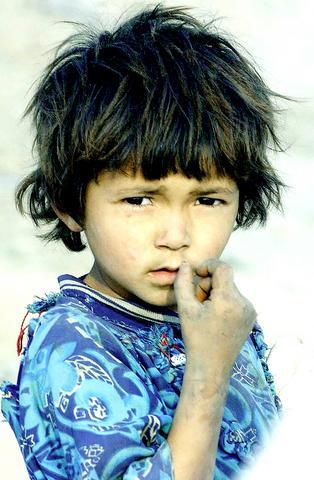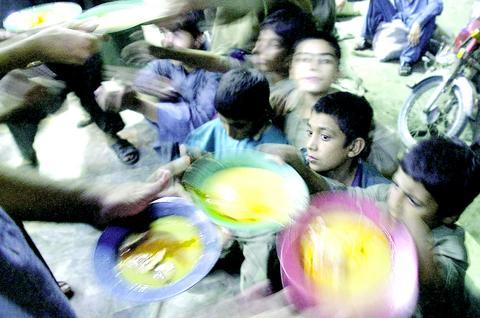Sitting outside a government-administered zakat (charity) office, Parveen Naz waits her turn to cajole a desk worker for the paltry grant to feed her four children and ailing husband.
Naz, 32, a telephone operator who suffers tuberculosis and looks a decade a older due to malnutrition, has been struggling to keep herself and her family alive since she and her spouse were laid off more than two years ago.

PHOTO: AFP
"I would have committed suicide, because at times it becomes intolerable to see my children's famished faces," Naz said, despairing of getting much help from the corruption-riddled zakat office. "But it's their existence which prevents me from doing so."

PHOTO: AFP
Her husband began sniffing heroin after protracted unemployment, and has left all family responsibility to Naz.
"I have lost two sons because I couldn't get medical treatment for them. I do not want to lose the surviving children, but all I can see is darkness ahead," she said.
Naz' family is not alone in its misery.
Some 50 million Pakistanis or 33 percent of the population are living in poverty, according to the State Bank of Pakistan's annual report released last week.
Poverty has risen 13 percent over the past 15 years, the report found, despite the economy's skyrocketing performance on paper in the past three years.
Expecting any significant short-term drop in poverty was "simply a pipedream," according to a sober warning by the central bank.
The Pakistani economy has performed robustly since 2000 with most major economic indicators beating all-time records.
Foreign exchange reserves have soared from a mere US$1.97 billion in 2000 to above US$11 billion last September; exports grew 22 percent to US$11 billion for the year ended June and GDP grew by 5.1 percent, compared to 3.6 percent previous year.
But appears to be strong economic growth has had little impact on the lives of tens of millions of Pakistanis.
"Despite the impressive improvement in macroeconomic fundamentals, the popular perception about the economy amongst media and commentators does not reflect the improvement," the central bank stated in its annual report last week.
The bank blamed poor economic policies of the previous regimes of now-exiled Prime Ministers Benazir Bhutto and Nawaz Sharif since 1987.
But independent economists pointed the finger at the current administration of President Pervez Musharraf.
"The government has compiled data for the Pakistan household integrated survey but is reluctant to make it public because I am sure that reveals a further increase in poverty," Qaiser Bengali, chief of the Social Policy and Development Centre (SPDC) said.
The survey is one of the main mechanisms for evaluating the impact of social developments in Pakistan.
He said boosting public spending was the only answer.
"The debate is not whether [poverty] is 33 percent or 36 percent but the focus must be on how to eradicate it meaningfully. Only a well-directed and high public development expending could arrest the trend."
Islamabad awarded a record 30 percent boost to development spending in the annual budget in June to 160 billion rupees (US$2.8 billion) or 3.6 percent of GDP.
Economists shrug off the increase as inadequate.
"Any level of public development expenditure below 7 percent of GDP could hardly make a dent in poverty levels or propel sustainable economic growth," economist Shahid Hasan Siddiqui said.
The only way to reverse poverty growth would be economic growth of 6.0 to 7.0 percent for the next five to six years, economists and the bank agree.
"There is no magic wand to eliminate poverty, unless we catch up with sustainable growth rate of 6 percent," central bank governor Ishrat Husain said.

CHAMPIONS: President Lai congratulated the players’ outstanding performance, cheering them for marking a new milestone in the nation’s baseball history Taiwan on Sunday won their first Little League Baseball World Series (LLBWS) title in 29 years, as Taipei’s Dong Yuan Elementary School defeated a team from Las Vegas 7-0 in the championship game in South Williamsport, Pennsylvania. It was Taiwan’s first championship in the annual tournament since 1996, ending a nearly three-decade drought. “It has been a very long time ... and we finally made it,” Taiwan manager Lai Min-nan (賴敏男) said after the game. Lai said he last managed a Dong Yuan team in at the South Williamsport in 2015, when they were eliminated after four games. “There is

Chinese Nationalist Party (KMT) lawmakers have declared they survived recall votes to remove them from office today, although official results are still pending as the vote counting continues. Although final tallies from the Central Election Commission (CEC) are still pending, preliminary results indicate that the recall campaigns against all seven KMT lawmakers have fallen short. As of 6:10 pm, Taichung Legislators Yen Kuan-heng (顏寬恒) and Yang Chiung-ying (楊瓊瓔), Hsinchu County Legislator Lin Szu-ming (林思銘), Nantou County Legislator Ma Wen-chun (馬文君) and New Taipei City Legislator Lo Ming-tsai (羅明才) had all announced they

Nvidia Corp CEO Jensen Huang (黃仁勳) yesterday visited Taiwan Semiconductor Manufacturing Co (TSMC, 台積電), as the chipmaker prepares for volume production of Nvidia’s next-generation artificial intelligence (AI) chips. It was Huang’s third trip to Taiwan this year, indicating that Nvidia’s supply chain is deeply connected to Taiwan. Its partners also include packager Siliconware Precision Industries Co (矽品精密) and server makers Hon Hai Precision Industry Co (鴻海精密) and Quanta Computer Inc (廣達). “My main purpose is to visit TSMC,” Huang said yesterday. “As you know, we have next-generation architecture called Rubin. Rubin is very advanced. We have now taped out six brand new

POWER PLANT POLL: The TPP said the number of ‘yes’ votes showed that the energy policy should be corrected, and the KMT said the result was a win for the people’s voice The government does not rule out advanced nuclear energy generation if it meets the government’s three prerequisites, President William Lai (賴清德) said last night after the number of votes in favor of restarting a nuclear power plant outnumbered the “no” votes in a referendum yesterday. The referendum failed to pass, despite getting more “yes” votes, as the Referendum Act (公民投票法) states that the vote would only pass if the votes in favor account for more than one-fourth of the total number of eligible voters and outnumber the opposing votes. Yesterday’s referendum question was: “Do you agree that the Ma-anshan Nuclear Power Plant